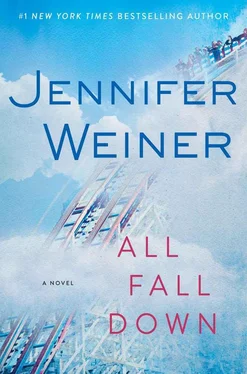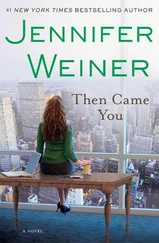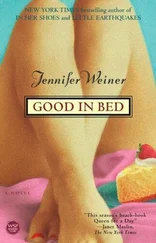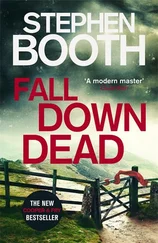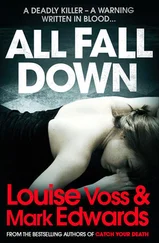Have you ever felt like you should cut down on your drinking or drug use?
Feeling suddenly queasy, I lifted my head and looked around the waiting room again to see if anyone had noticed that I was taking this quiz seriously. Did I think about cutting down? Sure. Sometimes. More and more often I had the nagging feeling that things were getting out of control. Then I’d think, Oh, please. I had prescriptions for everything I took (and if Doctor A didn’t know what Doctor B was giving me, well, that wasn’t necessarily a problem—if it was, pharmacies would be set up to flag it, right?). The pills helped me manage everything I needed to manage.
Have other people criticized your drinking or drug use, or been annoyed by it?
I checked “No,” fast and emphatically, trying not to think about how nobody criticized my use because nobody knew about it. Dave knew I had a prescription for Vicodin—he’d been there the night I’d come hobbling home from the gym—but he had no idea how many times I’d gotten that prescription refilled, telling my doctor that I was doing my physical-therapy-prescribed exercises religiously (I wasn’t), but that I still needed something for the pain. Dave didn’t know how easy it was, if you were a woman with health insurance and an education, a woman who spoke and dressed and presented herself a certain way. Good manners and good grammar, in addition to an MRI that showed bulging discs or an x-ray with impacted molars, could get you pretty much anything you wanted. With refills. Pain was impossible to see, hard to quantify, and I knew the words to use, the gestures to make, how to sit and stand as if every breath was agony. It was my little secret, and I intended to keep it that way.
“Eloise Weiss?” I looked up. A nurse stood in the doorway with Ellie’s chart in his hands.
Startled, I half jumped to my feet, and felt my back give a warning twinge, as if to remind me how I’d gotten into this mess. I wanted a pill. I’d had only one, that morning, six hours ago, and I wanted something, a dam against the rising anxiety about whether my marriage was foundering and if I was a good parent and when I’d find the time to finish the blog post that was due at six o’clock. I wanted to feel good, centered and calm and happy, able to appreciate what I had—my sunny kitchen, with orchids blooming on the windowsill; Ellie’s bedroom, for which I’d finally found the perfect pink chandelier. I wanted to slip into my medicated bubble, where I was safe, where I was happy, where nothing could hurt me. As soon as this is over, I told myself, and imagined sitting behind the wheel once the doctor had let us go and swallowing a white oval-shaped pill while Ellie fussed with her seat belt. With that picture firmly in mind, I reached out my hand for my daughter.
“No shots,” she said, her lower lip already starting to tremble.
“I don’t think so.”
“No SHOTS! You SAID! You PROMISED!” Heads turned in judgment, mothers probably thinking, Thank God mine’s not like that. Ellie crossed her arms over her chest and stood there, forty-three pounds of fury in a flowered Hanna Andersson dress, matching socks and cardigan, and zip-up leopard-print high-top sneakers. Her fine brown hair hung in braided pigtails, tied with purple elastic bands, and she had a stretchy flowered headband wrapped, hippie-style, around her forehead.
The nurse gave me a smile that was both sympathetic and weary, as I half walked, half dragged my daughter off to the scales and blood-pressure cuffs. Eloise whined and balked and winced as she was weighed and measured. The nurse took her blood pressure and temperature. Then the two of us were left to wait in an exam room. “Put this on,” the nurse said, handing Ellie a cotton gown. Ellie pinched the gown between two fingertips. “It will ITCH,” she said, and started to cry.
“Come on,” I said, taking the gown, with its rough texture and offending tags, in my hand. “I bet if you just get your dress off, you’ll be okay.”
Still sniffling, Ellie bent gracefully at the waist—she’d gotten her ease in the physical world from her father, who ran and ice-skated and, unlike me, did not inhabit a universe where the furniture seemed to reposition itself just so I could trip over or bang into it. I watched as she eased each zipper on her high-tops down, slid her foot out of her right shoe, pulled off her pink sock, and laid it carefully on top of the sneaker. Off came the left shoe. Off came the left sock. I sat down in the plastic chair as Ellie moved on to her cardigan. I had never mistreated her while under the influence. I’d never yelled (well, not scary-yelling), or been rough, or told her that she needed to put on her goddamn clothes this century, because we couldn’t be late for school again, because I couldn’t sit through another lecture about Your Responsibilities to Stonefield: A Learning Community (calling it just a “school,” I supposed, would have failed to justify its outrageous tuition). It was the opposite. The pills calmed me down. They gave me a sense of peace. When I swallowed them, I felt like I could accomplish anything, whether it was writing a post about the rising costs of fertility treatments or getting my daughter to school on time.
“Mom-MEE.” I looked at Ellie. Glory be, she’d gotten all the way down to her Disney Princess underpants. I held open the gown. She made a face. “Just try it,” I said. Finally, with the hauteur of a high-fashion model being forced to don polyester, she slipped her arms through the sleeves and permitted me to knot the ties in the back while she pinched the fabric between her fingertips, holding it ostentatiously away from her body, making sure the tag wouldn’t touch her. She retrieved my iPad and cued up Les Miz. I went back to my quiz. Have you ever used more than you could afford? Hardly. My doctors would write me prescriptions. My copay was fifteen dollars a bottle. But it was true that the bottles were no longer lasting as long as they were supposed to, and I spent what was beginning to feel like a lot of time figuring out how many pills I had left and which doctor I hadn’t called in a while and whether the pharmacist was looking at me strangely because I was picking up Vicodin two or three times a week.
Have you ever planned not to use that day but done it anyway?
Yes. I had thought about stopping. I had tried, a few times, and managed, for a few days . . . but during the last few not-today days, it was as if my brain and body had disconnected at some critical juncture. I’d be standing in my closet, in my T-shirt or the workout clothes I’d put on in the hope that wearing them would make me more inclined to exercise, thinking No, while watching my body from the outside, watching my hands uncap the bottle, watching my fingers select a pill.
Have you ever not been able to stop when you planned to?
“Mommy?” Ellie sat on the examining table, legs crossed, gown spread neatly in her lap. “Are you mad?” she asked. Her lower lip was quivering. She looked like she was on the verge of tears. Then again, Eloise frequently appeared to be on the verge of tears. When she was a baby, a slammed car door or the telephone ringing could jolt her out of her nap and into a full-fledged shrieking meltdown. In her stroller, she’d cringe at street noises; a telephone ringing, a taxi honking. Even the unexpected rustling of tree branches overhead could make her flinch.
“No, honey. Why?”
“Your face looks all scrunchy.”
I made myself smile. I held out my arms and, after a moment’s hesitation, Ellie hopped off the table and sat on my lap, folding her upper body against mine. I breathed in her little-girl smell—a bit like cotton candy, like graham crackers and library books—and pressed my cheek against her soft hair, thinking that even though she was high-strung and thin-skinned, Ellie was also smart and funny and undeniably lovely, and that I would do whatever I could to maximize her chances of being happy. I wouldn’t be like my own mother, a circa 1978 party girl who hadn’t realized that the party was over, a woman who’d slapped three coats of quick-drying lacquer over herself at twenty-six—teased hair, cat-eye black liquid liner, a slick, lipglossed pout, and splashes of Giorgio perfume—and gotten so involved in her tennis group, her morning walk buddies, her mah-jongg ladies, her husband and his health that she had little time for, or interest in, her only child. I knew my mother loved me—at least, she said so—but when I was a girl at the dinner table, or out in the driveway, where I’d amuse myself by hitting a tennis ball against the side of the garage, my mother would look up from her inspection of her fingernails or her People magazine and gaze at me as if I were a guest at a hotel who should have checked out weeks before and was somehow, inexplicably, still hanging around.
Читать дальше
